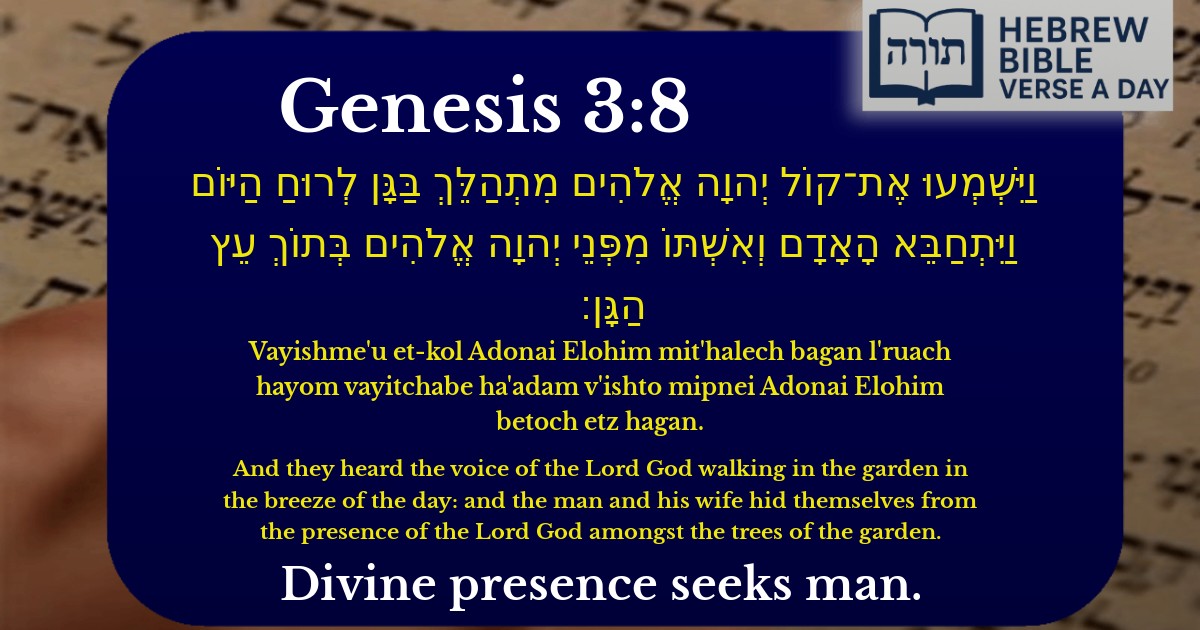Join Our Newsletter To Be Informed When New Videos Are Posted
Join the thousands of fellow Studends who rely on our videos to learn how to read the bible in Hebrew for free!
Hebrew Text
וַיִּשְׁמְעוּ אֶת־קוֹל יְהוָה אֱלֹהִים מִתְהַלֵּךְ בַּגָּן לְרוּחַ הַיּוֹם וַיִּתְחַבֵּא הָאָדָם וְאִשְׁתּוֹ מִפְּנֵי יְהוָה אֱלֹהִים בְּתוֹךְ עֵץ הַגָּן׃
English Translation
And they heard the voice of the Lord God walking in the garden in the breeze of the day: and the man and his wife hid themselves from the presence of the Lord God amongst the trees of the garden.
Transliteration
Vayishme'u et-kol Adonai Elohim mit'halech bagan l'ruach hayom vayitchabe ha'adam v'ishto mipnei Adonai Elohim betoch etz hagan.
Hebrew Leining Text
וַֽיִּשְׁמְע֞וּ אֶת־ק֨וֹל יְהֹוָ֧ה אֱלֹהִ֛ים מִתְהַלֵּ֥ךְ בַּגָּ֖ן לְר֣וּחַ הַיּ֑וֹם וַיִּתְחַבֵּ֨א הָֽאָדָ֜ם וְאִשְׁתּ֗וֹ מִפְּנֵי֙ יְהֹוָ֣ה אֱלֹהִ֔ים בְּת֖וֹךְ עֵ֥ץ הַגָּֽן׃
Parasha Commentary
📚 Talmud Citations
This verse is quoted in the Talmud.
📖 Chagigah 12b
The verse is discussed in the context of understanding how God's presence was manifest in the Garden of Eden.
📖 Sanhedrin 38b
The verse is referenced in a discussion about the nature of Adam and Eve's sin and their subsequent hiding from God.


The Voice of Hashem in the Garden
The verse describes Adam and Chava hearing "the voice of Hashem walking in the garden" (קוֹל יְהוָה אֱלֹהִים מִתְהַלֵּךְ בַּגָּן). Rashi explains that this refers to the Divine Presence (Shechinah) moving through Gan Eden with a sound like footsteps, coming to administer justice (Rashi on Bereishit 3:8). The Midrash Tanchuma (Bereishit 8) elaborates that Hashem appeared in the guise of a king visiting his garden, demonstrating His closeness to humanity even after their sin.
The Time of Divine Encounter
The phrase "in the breeze of the day" (לְרוּחַ הַיּוֹם) is interpreted by Ramban as referring to the afternoon, when the day begins to cool (Ramban on Bereishit 3:8). The Talmud (Sanhedrin 38b) notes that this was the very day of creation, showing how quickly Adam and Chava transgressed. The Sforno adds that this timing reflects Hashem's mercy—He waited until the heat of judgment cooled before confronting them.
The Hiding of Adam and Chava
Their hiding "amongst the trees of the garden" (בְּתוֹךְ עֵץ הַגָּן) is addressed by several commentators:
Theological Implications
The Midrash Rabbah (Bereishit 19:8) emphasizes that Hashem's "walking" represents His constant supervision of creation. The Or HaChaim notes that the verse uses both names Hashem (mercy) and Elokim (justice), showing that Divine judgment was tempered with compassion even after their sin (Or HaChaim on Bereishit 3:8).